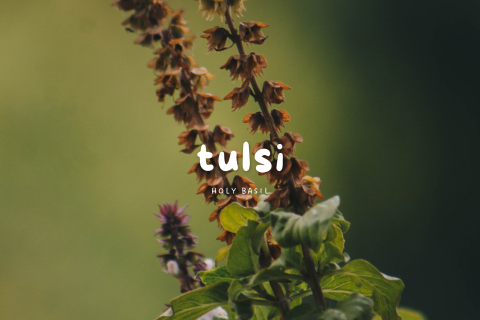
The History of Tulsi (Holy Basil)
Tulsi, scientifically known as Ocimum tenuiflorum, has been revered in India for thousands of years. It is also known as "holy basil" due to its deep spiritual and cultural significance in Hinduism and its revered status in Ayurvedic medicine.
In Sanskrit, it is called तुलसी (Tulasi), symbolizing its sacredness and significance in Hindu culture.
In Chinese, it is referred to as 罗勒 (Luólè), which translates to basil, though Tulsi holds unique religious and medicinal importance distinct from other basil varieties.
Within the spiritual realm, Tulsi is considered a sacred plant that helps purify the mind and body. It is used in worship rituals and its aroma is believed to elevate spiritual awareness.
According to ancient Vedic literature, Tulsi is regarded as an incarnation of the goddess Tulasi and is credited with divine qualities. The presence of Tulsi in the home is believed to bring good fortune and purify the environment.

Tulasi, is deeply revered in Hinduism and is often regarded as a manifestation of the goddess Lakshmi, the consort of Lord Vishnu. According to legend, Tulasi was once a devoted woman named Vrinda, whose unwavering loyalty to her husband, the demon king Jalandhar, made him invincible in battle. However, to weaken Jalandhar, Lord Vishnu took on his form and deceived Vrinda, breaking her fidelity.
Upon realizing the deception, Vrinda, stricken with grief and shame, threw herself onto her husband's funeral pyre. Moved by her devotion, Vishnu transformed her into the sacred Tulsi plant (Ocimum tenuiflorum). Tulsi is now venerated as the goddess of purity and devotion, with her name meaning "the incomparable one".
The Characteristics of Tulsi
Tulsi possesses a remarkable range of medicinal properties. It contains antioxidant and anti-inflammatory compounds that can help fight disease and strengthen the immune system. In Ayurveda, Tulsi has been classified as a Rasayana, a herb that rejuvenates the body and promotes longevity.
A sacred plant that has been around for thousands of years, with its wonderful healing properties, you can experience the holistic healing and revitalizing properties that Tulsi has to offer, enriching your inner health.

What Benefits does Tulsi provide?
Tulsi helps the body adapt to stress, promoting emotional balance and mental clarity. Regular use of Tulsi supplements can lead to significant reductions in stress and anxiety, enhancing overall mood and well-being.
Additionally, Tulsi is rich in antioxidants and possesses powerful antimicrobial properties, making it an excellent ally for immune support and respiratory health. By alleviating cough and congestion, Tulsi can help maintain clearer airways, promoting easier breathing.
Its anti-inflammatory effects are beneficial for those suffering from chronic inflammatory conditions, providing relief from pain and discomfort. Moreover, Tulsi can also aid digestion, stimulating the digestive system and alleviating issues such as bloating and gas.
Incorporating Tulsi Supplements into your daily routine can be an effective way to boost your overall health and vitality, making it a valuable addition to your daily routine.
Benefits
- Offering Adaptogenic Support: One of Tulsi's most celebrated benefits is its ability to alleviate stress and anxiety. By regulating cortisol levels and enhancing the body's resilience to stressors, Tulsi promotes emotional stability and mental clarity. Regular consumption can lead to improved mood and a sense of calm.
- Enhances Respiratory Health: Tulsi is rich in antioxidants and possesses antimicrobial properties, making it a powerful ally for the immune system. It helps the body fend off infections and illnesses, enhancing overall health. Tulsi has also been shown to support respiratory health by alleviating cough and congestion.
- Anti-Inflammatory Effects: The anti-inflammatory properties of Tulsi make it beneficial for reducing inflammation in the body. This can be particularly helpful for individuals suffering from chronic inflammatory conditions such as arthritis or allergies.
- Digestive Health: Tulsi can aid in digestion and relieve gastrointestinal discomfort. Its ability to stimulate the digestive system helps improve appetite and alleviate symptoms of indigestion, gas, and bloating.

Tulsi and Ayurveda
Tulsi has a sharp taste (rasa) and a warming effect (virya) on the body, accompanied by a strong post-digestive impact known as vipaka.
In Ayurveda, rasa refers to the basic taste of a substance, which can influence how it interacts with the body. Virya describes the energetic effect a substance has when consumed, and vipaka refers to the taste that remains after digestion, indicating how the body processes the herb over time.
Tulsi is known to balance the vata and kapha doshas, which are the biological energies in Ayurveda that govern various physiological functions. However, excessive consumption of Tulsi may increase pitta dosha, leading to an imbalance.
Tulsi is rich in sattva, the principle associated with light, clarity, and perception. Ayurveda encourages us to embrace sattvic energy to enhance these qualities within ourselves.
Additionally, Tulsi is believed to enhance and safeguard ojas and prana, two essential life forces in the body. Ojas is associated with joy, vitality, and a strong immune system, while prana represents the vital life force that underpins intelligence, communication, and sensory perception.

Who Is Tulsi Good For?
- Chronic Stress and Anxiety: If you are dealing with high levels of stress, anxiety, or emotional instability can greatly benefit from Tulsi's ability to promote stress relief and emotional balance. Regular consumption can help enhance their mental clarity and improve overall mood, leading to a more stable emotional state.
- Digestive Issues: If you suffer from gastrointestinal discomfort, such as bloating, gas, or indigestion, you can benefit from Tulsi’s ability to stimulate digestion and relieve these symptoms. It can help improve appetite and promote a healthier digestive system, making it a valuable addition to their wellness routine.
- Inflammatory Conditions: If you suffer from conditions like arthritis or allergies, you can find relief in Tulsi’s anti-inflammatory properties. By reducing inflammation in the body, Tulsi can help manage pain and discomfort associated with these chronic conditions.
- Respiratory Issues: If you are suffering from respiratory conditions such as asthma, allergies, or frequent colds, you can benefit from Tulsi's immune-boosting and respiratory-supporting properties. Its antimicrobial effects can help alleviate cough and congestion, promoting better breathing and overall respiratory health.
By incorporating Tulsi into your daily routine, you can harness its power to enhance your physical, mental, and emotional well-being, making it a truly invaluable addition to your life.
How to Take Tulsi
Tulsi can be taken in various forms to maximize its health benefits and fit seamlessly into your daily routine.
Thanks to its uplifting, sattvic energy and warm pungency, Tulsi excels when consumed alone. Additionally, this herb harmonizes wonderfully with other components, making it a great addition to many formulations.

- Supplements: Adding Tulsi to your routine can be as simple as taking Daily Capsules. Benefit from it's immune-boosting properties, helping to strengthen your body’s defenses against common illnesses.
- Tulsi Powder: To enjoy the benefits of Tulsi powder, simply stir it into warm water and let it steep for a few minutes, creating a flavorful tea packed with health-boosting properties.
- Fresh Leaves: Add fresh Tulsi leaves to smoothies, salads, or soups for a nutritious and flavorful enhancement.
- Essential Oil: Use Tulsi essential oil for aromatherapy or topical applications, it can be used in massages to promote relaxation.
- Flavorful Herbal Delight: A recipe you might enjoy is Cardamom & Tulsi Kashayam, a traditional herbal drink known for its soothing properties.
Contraindications
Tulsi is not recommended for those who are pregnant or nursing, or those who are trying to become pregnant.
Additionally, it’s advisable to avoid Tulsi if you have low blood sugar levels. If you are currently on any medications, it's recommended to consult your Ayurvedic practitioner or healthcare provider before incorporating Tulsi into your life.







